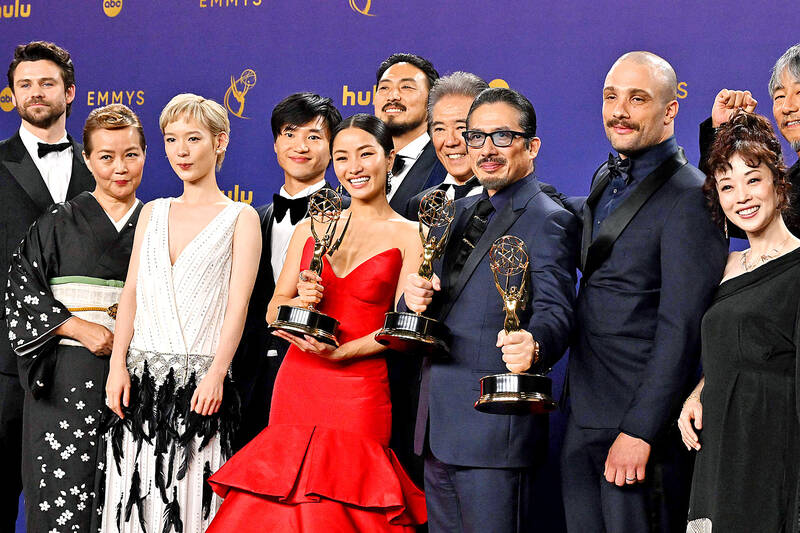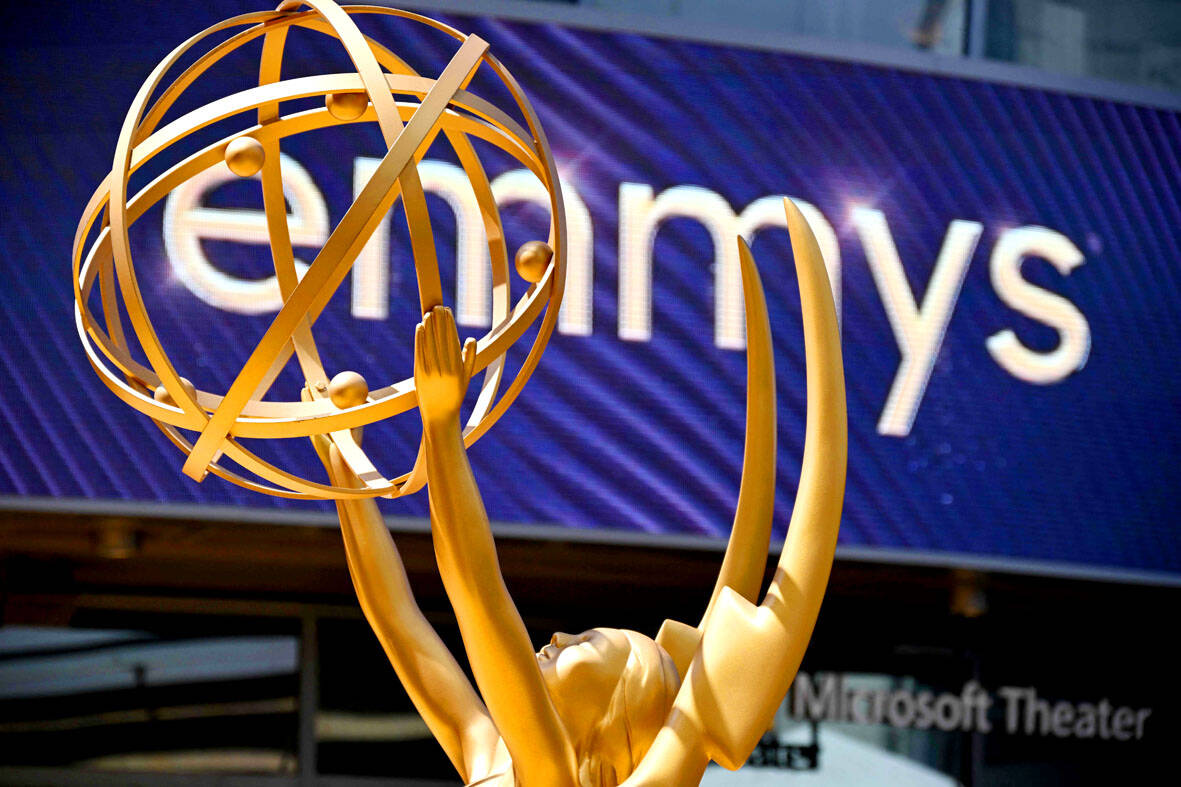“Shogun” had historic wins in an epic 18-Emmy first season, “Hacks” scored an upset for best comedy on what was still a four-trophy night for “The Bear,” and “Baby Reindeer” had a holiday at an Emmy Awards that had some surprising swerves.
“Shogun,” the FX series about power struggles in feudal Japan, won best drama series, Hiroyuki Sanada won best actor in a drama, and Anna Sawai won best actress. Sanada was the first Japanese actor to win an Emmy. Sawai became the second just moments later.
“‘Shogun’ taught me when we work together, we can make miracles,” Sanada said in his acceptance speech from the stage of the Peacock Theater in Los Angeles.

Photo: AFP
Along with 14 Emmys it claimed at the precursor Creative Arts Emmys, it had an unmatched performance with 18 overall for one season.
“Hacks” was the surprise winner of its first best comedy series award, topping “The Bear,” which most had expected to take it after big wins earlier in the evening.
Jean Smart won her third best actress in a comedy award for the third season of Max’s “Hacks,” in which her stand-up comic character Deborah Vance tries to make it in late-night TV. Smart has six Emmys overall.

Photo: AFP
Despite losing out on the night’s biggest comedy prize after winning it for its first season at January’s strike-delayed ceremony, FX’s “The Bear” star Jeremy Allen White won best actor in a comedy for the second straight year, and Ebon Moss-Bachrach repeated as best supporting actor.
And Liza Colon-Zayas was the surprise best supporting actor winner over competition that included Meryl Streep, becoming the first Latina to win in the category.
“To all the Latinas who are looking at me,” she said, her eyes welling with tears, “keep believing, and vote.”
Netflix’s darkly quirky “Baby Reindeer” won best limited series. Creator and star Richard Gadd won for his lead acting and his writing and Jessica Gunning, who plays his tormentor, won best supporting actress.
Accepting the series award, Gadd urged the makers of television to take chances.
“The only constant across any success in television is good storytelling,” he said. “Good storytelling that speaks to our times. So take risks, push boundaries. Explore the uncomfortable. Dare to fail in order to achieve.”
“Baby Reindeer” is based on a one man-stage show in which Gadd describes being sexually abused along with other emotional struggles.
Accepting that award, he said, “no matter how bad it gets, it always gets better.”
Jodie Foster won her first Emmy to go with her two Oscars when she took best actress in a limited series for “True Detective: Night Country.”
Foster played a salty police chief investigating a mass killing in the round-the-clock dark of an Alaskan winter on the HBO show. While her castmate Kali Reis missed out on becoming the first Indigenous actor to win an Emmy in the supporting category, Foster praised her, and the show’s collaboration with Indigenous contributors.
“The Inupiaq and Inuit people of northern Alaska who told us their stories, and they allowed us to listen,” Foster said. “That was just a blessing. It was love, love, love, and when you feel that, something amazing happens.”
Greg Berlanti, a producer and writer on shows including “Dawson’s Creek” and “Everwood,” received the Television Academy’s Governors Award for his career-long contributions to improving LGBTQ visibility on television. He talked about a childhood when there was little such visibility.
“There wasn’t a lot of gay characters on television back then, and I was a closeted gay kid,” Berlanti said. “It’s hard to describe how lonely that was at the time,”
The long decline of traditional broadcast TV at the Emmys continued, with zero wins between the four broadcast networks.
In the monologue that opened the ABC telecast, Dan Levy, who hosted with his father and “Schitt’s Creek” co-star Eugene Levy, called the Emmys “broadcast TV’s biggest night for honoring movie stars on streaming services.”
Though other than Foster, movie stars didn’t fare too well. Her fellow Oscar winners Streep and Robert Downey Jr had been among the favorites, but came up empty.
“Robert Downey Jr I have a poster of you in my house!” said Lamorne Morris, who beat Downey for best supporting actor in a limited series, said from the stage as he accepted his first Emmy.
The evening managed to meet many expectations but included several swerves like the win for “Hacks.”
“We were really shocked,” “Hacks co-creator Jen Statsky, who also won for writing, said after the show. ”We were truly, really surprised.”
And “Shogun” got off to a quiet start, missing on early awards and not getting its first trophy until past the halfway point.
Still, it shattered the record for Emmys for one season previously held by the 2008 limited series “John Adams” in 2008. And its acting wins would have been hard to imagine before the series became an acclaimed phenomenon.
Sanada is a 63-year-old longtime screen star whose name is little known outside Japan, even if his face is through Hollywood films like “The Last Samurai” and “John Wick Chapter 4.” Sawai, 32, who was born in New Zealand and moved to Japan as a child, is significantly less known in the US. She wept when she accepted best actress.
“When you saw me cry on stage, it was probably the 12th time I cried today,” Sawai said backstage. “It was just mixed emotions, wanting everyone to win all that. I may cry again now.”
“The Bear” would finish second with 11 overall Emmys, including guest acting wins at the Creative Arts ceremony for Jamie Lee Curtis and Jon Bernthal.
The Levys in their opening monologue mocked the show being in the comedy category.
“In honor of ‘The Bear’ we will be making no jokes,” Eugene Levy said, to laughs.
Elizabeth Debicki took best supporting actress in a drama for playing Princess Diana at the end of her life in the sixth and final season of “The Crown.”
“Playing this part, based on this unparalleled, incredible human being, has been my great privilege,” Debicki said in her acceptance. “It’s been a gift.”
Several awards were presented by themed teams from TV history, including sitcom dads George Lopez, Damon Wayans and Jesse Tyler Ferguson and TV moms Meredith Baxter, Connie Britton, and Susan Kelechi Watson.

The Democratic Progressive Party (DPP), Chinese Nationalist Party (KMT), and the country’s other political groups dare not offend religious groups, says Chen Lih-ming (陳立民), founder of the Taiwan Anti-Religion Alliance (台灣反宗教者聯盟). “It’s the same in other democracies, of course, but because political struggles in Taiwan are extraordinarily fierce, you’ll see candidates visiting several temples each day ahead of elections. That adds impetus to religion here,” says the retired college lecturer. In Japan’s most recent election, the Liberal Democratic Party lost many votes because of its ties to the Unification Church (“the Moonies”). Chen contrasts the progress made by anti-religion movements in

Taiwan doesn’t have a lot of railways, but its network has plenty of history. The government-owned entity that last year became the Taiwan Railway Corp (TRC) has been operating trains since 1891. During the 1895-1945 period of Japanese rule, the colonial government made huge investments in rail infrastructure. The northern port city of Keelung was connected to Kaohsiung in the south. New lines appeared in Pingtung, Yilan and the Hualien-Taitung region. Railway enthusiasts exploring Taiwan will find plenty to amuse themselves. Taipei will soon gain its second rail-themed museum. Elsewhere there’s a number of endearing branch lines and rolling-stock collections, some

Last week the State Department made several small changes to its Web information on Taiwan. First, it removed a statement saying that the US “does not support Taiwan independence.” The current statement now reads: “We oppose any unilateral changes to the status quo from either side. We expect cross-strait differences to be resolved by peaceful means, free from coercion, in a manner acceptable to the people on both sides of the Strait.” In 2022 the administration of Joe Biden also removed that verbiage, but after a month of pressure from the People’s Republic of China (PRC), reinstated it. The American

This was not supposed to be an election year. The local media is billing it as the “2025 great recall era” (2025大罷免時代) or the “2025 great recall wave” (2025大罷免潮), with many now just shortening it to “great recall.” As of this writing the number of campaigns that have submitted the requisite one percent of eligible voters signatures in legislative districts is 51 — 35 targeting Chinese Nationalist Party (KMT) caucus lawmakers and 16 targeting Democratic Progressive Party (DPP) lawmakers. The pan-green side has more as they started earlier. Many recall campaigns are billing themselves as “Winter Bluebirds” after the “Bluebird Action”